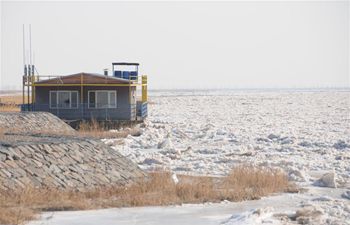NEW YORK, Jan. 3 (Xinhua) -- The U.S. airstrike that had killed one of Iran's most powerful generals sent oil prices significantly higher on Friday, as market participants feared an escalation of the tensions in the Middle East could disrupt energy flows in the region.
The West Texas Intermediate (WTI) for February delivery rose 1.87 U.S. dollars to settle at 63.05 dollars a barrel on the New York Mercantile Exchange, after trading as high as 64.09 dollars. The settlement was the highest for a front-month contract since May 20, according to Dow Jones Market Data.
Brent crude for March delivery soared 2.35 dollars to close at 68.60 dollars a barrel on the London ICE Futures Exchange after trading as high as 69.50 dollars a barrel.
"Clearly there is a new level of geopolitical risk in the markets, reflected by the market's immediate reaction that pushed up Brent by several dollars," said Richard Nephew and Jason Bordoff, scholars from Columbia University's Center on Global Energy Policy, in a note on Friday.
The tensions between the United States and Iran have dramatically escalated following the killing of Iranian Major General Qassem Soleimani in a U.S. airstrike on Friday in Iraq's capital of Baghdad.
Iran's Islamic Revolution Guards Corps (IRGC) on Friday confirmed the killing of Soleimani, commander of the Quds Force of the IRGC, in an airstrike on Baghdad's international airport by U.S. helicopters in the early morning.
Meanwhile, the U.S. Defense Department announced it conducted the attack under President Donald Trump's direction as a "defensive action" against Soleimani, who it said was planning further attacks on U.S. diplomats and service members in Iraq.
Senior Iranian officials on Friday strongly condemned the assassination of Soleimani, while vowing to take revenge.
"Market participants are concerned that the tensions between Iran and the United States could impact the political stability of Iraq and the oil production in the second largest OPEC (Organization of the Petroleum Exporting Countries) producer after Saudi Arabia," said analysts at Swiss investment bank UBS.
The Middle East is home to almost half of the world's proved oil reserves and accounts for one-third of global oil supply.
Iran and Iraq produced 2.13 million barrels per day (mbpd) and 4.65 mpbd of crude in November 2019, respectively, and combined accounted for nearly 8 percent of global oil liquids supply in the same month, statistics showed.
While a number of U.S. oil workers have been evacuated from the Iraqi oil fields near Basra, the Iraqi oil ministry on Friday highlighted that production and exports have so far not been affected.
A more serious escalation in the Middle East would have a broader economic and financial market impact through sharply higher crude oil prices, but as no one knows if, when, and how Iran will respond to the fatal airstrike, the risks of threatening crude supply from the region remain, noted experts.
"Considering these risks, markets have added a risk premium on fears tensions could escalate," said UBS analysts, adding that "how long the risk premium on oil lasts will depend on whether oil flows are impacted or not."
Elsewhere, a larger-than-expected drop in U.S. crude stocks also lent some support.
The U.S. Energy Information Administration (EIA) said Friday that U.S. commercial crude oil inventories decreased by 11.5 million barrels for the week ending Dec. 27. Analysts had been expecting a decline of 5.5 million barrels.
Although a further escalation in geopolitical tensions could provide additional short-term upside to oil, experts noted the downtrend risk remains as they expect an oversupplied oil market in 2020, particularly in the first half of the year, on the back of non-OPEC supply growth driven by the United States outpacing modest oil demand growth.
In its year-end Short-Term Energy Outlook released in December 2019, EIA forecast that Brent spot prices would be lower on average in 2020 than in 2019 due to the forecast of rising global oil inventories, particularly in the first half of next year.
EIA forecast Brent spot prices would average 61 U.S. dollars per barrel in 2020, down from the 2019 average of 64 dollars per barrel, while WTI prices would average 5.50 dollars per barrel less than Brent prices in 2020.
The U.S. benchmark WTI notched up more than 34 percent in 2019, the strongest annual performance since 2016, while the global benchmark Brent crude advanced nearly 23 percent.

















